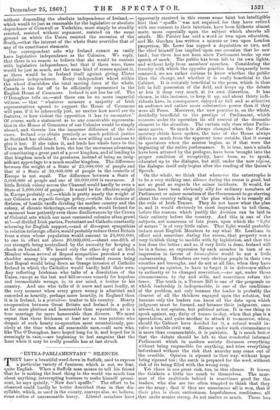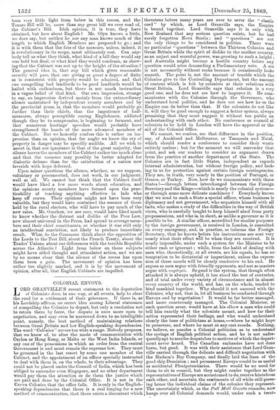"EXTRA-PARLIAMENTARY " SILENCES.
THEY have a beautiful word down in Suffolk, used to express a particular variety of fussiness, which is not, we fear, quite English. When a Suffolk man means to tell his friend that he is making the least thing in the world too much fuss about anything, interrupting business to make himself promi- nent, he says quietly, " Now don't spuffle." The effort to be -observed could hardly be better described than in that dis- syllable, which, as used in the county, conveys also, we believe, some notion of unreasonable hurry. Liberal members have apparently received in this recess some faint bat intelligible hint that " spnffie " was not required, for they have retired with one consent to their interiors, have been hitherto almost mute, more especially upon the subject which absorbs all minds. Mr. Forster has said a word or two upon education, and Mr. Goschen has written a minute or two upon London pauperism, Mr. Lowe has rapped a deputation or two, and the chief himself has implied upon one occasion that he saw land ; but there has not been since Parliament broke up one speech of mark. The public has been left to its own lights, and without help from members' speeches. Considering the ferocity with which the opposite practice has frequently been censured, we are rather curious to know whether the public likes the change, and whether it is really beneficial to the Cabinet. It is certainly beneficial to the press, which is thus left in full possession of the field, and keeps up the debate or lets it drop very much at its own discretion. It has chosen, in this instance, to keep it up, and about thirty indi- viduals have, in consequence, enjoyed as full and as attentive an audience and rather more substantive power than if they were all Peers. Moreover, the new practice is, on the whole, decidedly beneficial to the prestige of Parliament, which recovers under its operation its old control of the dramatic element in the situation. The curtain only rises when Parlia- ment meets. So much is always changed when the Parlia- mentary chiefs have spoken, the tone of the House always differs so much from the apparent tone outside, that it seems to spectators when the session begins, as if that were the beginning of the entire performance. It is true, men's minds have been attuned by the prologue, have been brought into the proper condition of receptivity, have been, so to speak, educated up to the dialogue, but still, under the new re'girne, the dialogue itself only begins after the reading of the Queen's Speech. On the whole, we think that whenever the catastrophe is to be a very striking one, silence during the recess is good, but not so good as regards the minor incidents. It would, for instance, have been obviously silly for ordinary members of Parliament or minor members of the Government to go starring about the country talking of the plan which is to remedy all the evils of Irish Tenure. They do not know what the plan is, and it would obviously be most imprudent to tell them, before the reasons which justify the decision can be laid in their entirety before the country. And this is one of the subjects, not numerous of late years, upon which the " light of nature " is of very little value. That light would probably induce most English Members to say what Mr. Leatham in effect said sometime during the recess, that property was a very ticklish thing to meddle with by legislation, and that the less done the better ; and as, if very little is done, Ireland will be in a flame, an expression by each member in turn of an impression in favour of laissez-faire would be not a little embarrassing. Members are very obvious people in their own counties and boroughs, and do not at all like, when they have expressed an opinion, to have to forget it in deference either to authority or to changed conviction,—are apt, under those circumstances, to shy and sidle, and sometimes refuse the fence. The truth is, a Tenure Bill is one of the proposals on which leadership is indispensable, is one of the conditions of the problem, not only because the leader is probably the clearest of all the thinkers engaged upon the solution, but because only the leaders can know all the data upon which judgment must be formed, and because their judgment, once uttered, is not opinion, but political action. It is one thing to speak against, say, fixity of tenure to-day, when that plan is a speculation, and quite another to attack it to-morrow, when, should the Cabinet have decided for it, a refusal would in- volve a terrible civil war. Silence under such circumstances is more than commendable, it is patriotic. 1 is much better that the debate should be left to that wonderful informal Parliament which in modern society discusses everything without being responsible for anything, and tries everything beforehand without the risk that anarchy may come out of the crucible. Opinion is ripened in that way, without hope being ripened too ; the earth is prepared for the seed, without risk of its being filled with the wrong crop. Yet there is one great risk, too, in this silence. It leaves the thinkers a little too much to themselves. The mur- mur of the multitude behind is sometimes good for the leaders, who else are too often tempted to think that they are the army ; that if they are unanimous all is won, that if their plan is clear, enthusiasm, hopefulness, confidence, all that make armies strong, do not matter so much. There has been very little light from below in this recess, and the Tenure Bill will be, more than any great bill we ever read of, the Cabinet's Bill. Irish opinion, it is true, they have obtained, but how about English ? Mr. Glyn knows a little, we dare say, but neither he nor any man knows much of the length to which English Members are prepared to go ; and it is with them that the fate of the measure, unless, indeed, it is revolutionary in its scope, must ultimately rest. Can any- body tell us what they think, what kind of a bill they would say was bold but final, or what kind they would condemn, as show- ing that the Cabinet was not up to the height of the situation ? The general idea is, that any bill which gives reasonable security will pass, that one giving as great a degree of fixity as is consistent with property would be admired, and that one compelling bad landlords to be good landlords would be hailed with enthusiasm, but there is not much instruction in a vague belief of that kind. Our own impression, strange to say, an impression derived mainly from the extraordinary silence maintained by independent county members and by the provincial press, is, that the members would probably go further than their chiefs, that the impatience of half- measures, always perceptible among Englishmen, addicted though they be to compromise, is beginning to ferment, and that numerous hustings' speeches would probably have strengthened the hands of the more advanced members of the Cabinet. But we honestly confess this is rather an im- pression than an opinion, that for aught we know the cry of property in danger may be speedily audible. All we wish to assert is, that our ignorance is that of the great majority, that silence leaves the members of the Cabinet rather too much alone and that the measure may possibly be better adapted for dialectic defence than for the satisfaction of a nation now feverish with hope deferred.
Upon minor questions the silence, whether, as we suppose, voluntary or preconcerted, does not work, in our judgment, well at all. We cannot but think that the Cabinet itself would have liked a few more words about education, and the opinions county members have formed upon the prac- ticability of teaching anything effective to lads who keep off crows. Their opinions might not have been very valuable, but they would have contained the essence of those held by the rural electors, who will have to pay much of the new rates. Mr. Goschen, we are sure, would have liked much to know whether the distrust and dislike of the Poor Law, now almost universal in the Press, had spread to average mem- bers and their chief constituents, or whether it was still only an intellectual conviction, not likely to produce immediate result. What do the Commons think about the opposition of the Lords to the Test Bill, about the French Treaty, about the Trades' Unions, about our differences with the terrible Republic across the Atlantic ? Light from below on those subjects might have aided thought and stimulated action, and we are by no means clear that the silence of the recess has upon them been a gain. The movement of opinion has been rather too slightly marked, and it is by the movement of opinion, after all, that English Cabinets are impelled.



































 Previous page
Previous page